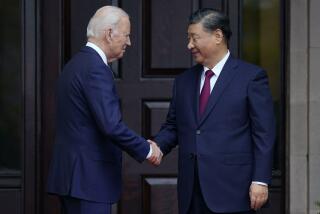Baker Presses China for Concessions : Diplomacy: But as the secretary prepares to return home, there’s no sign of movement by Beijing on human rights, other issues.
BEIJING — Secretary of State James A. Baker III held a series of tense and frosty meetings with top Chinese leaders Saturday but had no visible success in persuading them to make any changes concerning China’s human rights, trade or arms-export policies.
A senior State Department official said the meetings were “every bit as tough and as difficult, if not tougher,” than the talks with Arab and Israeli leaders earlier this year that led to the Mideast peace conference. And the U.S. official made clear that Baker is looking for some concessions from the Chinese leadership before he leaves Beijing for Washington today.
The lack of any clear progress Saturday set the stage for a possible showdown between U.S. and Chinese officials in the final hours before Baker’s departure from Beijing. Baker has a final meeting scheduled with Chinese Foreign Minister Qian Qichen this morning.
“They have a lot to think about,” said the senior State Department official, who briefed reporters on the condition that she would not be identified. “They understand where the secretary is coming from. . . . They (Chinese leaders) wanted for the secretary to come to China. Well, he’s here. . . . The United States has some expectations, yes.”
The official stressed that the Bush Administration, which has been under intense criticism in Congress for being too conciliatory toward China, would like to have some concrete results by the end of Baker’s visit.
“I’m not going to sit here and prejudge . . . what if anything the Chinese . . . are or are not going to do,” she said. “We will obviously . . . know one way or the other at the conclusion of the meeting tomorrow morning with the foreign minister.”
It was unusually harsh language for any foreign visitor to Beijing. The State Department official suggested that if Baker comes up empty on this trip, relations between the United States and China--which have been chilly since the regime’s bloody repression of the 1989 pro-democracy demonstrations in Tian An Men Square--may become still worse.
The Chinese government was equally tough in its account of the talks. Chinese Foreign Ministry spokesman Wu Jianmin stressed the theme of Chinese nationalism and said the Chinese leadership does not intend to be intimidated.
At a news briefing, Wu said Premier Li Peng told Baker: “The Chinese nation, with a history of more than 5,000 years, has a strong sense of national dignity. For more than 100 years in recent history, we the Chinese people suffered very much foreign aggression and humiliation. So we especially cherish our independence and sovereignty.”
B aker talked to Li for more than two hours Saturday, and he met for more than an hour with Chinese President Yang Shangkun, a military strongman and the most powerful figure among China’s active leaders. Yang and Li were among the key leaders behind the 1989 crackdown.
He also saw Communist Party General Secretary Jiang Zemin, Justice Minister Cai Cheng and Trade Minister Li Lanqing.
It was not clear whether the two sides are hopelessly far apart in their talks, or whether each side was staking out a tough position as a negotiating tactic as they bargained with one another.
Baker is apparently asking China to make some specific changes in its human rights policies. A State Department official acknowledged that human rights was “the most sensitive and difficult issue” in the talks and that the secretary of state had discussed the subject in very specific detail.
That appeared to suggest that Baker is asking China to release some political prisoners from jail or change the conditions of their confinement. Last spring, the United States drew up a list of about 800 political prisoners in China, gave it to the Chinese government and urged the regime to set them free.
There was no sign of movement by Beijing on trade or arms-export policies, either. U.S. officials have expressed irritation over China’s efforts to sell missiles to Pakistan and Syria and its transfer of nuclear technology to Iran and Algeria.
The Bush Administration has been hoping to persuade China to agree to abide by the Missile Technology Control Regime, a set of international rules restricting the export of missiles or the components and know-how to make them. But neither Chinese nor U.S. officials mentioned the issue in their briefings on Saturday’s meetings.
Asked at what point Baker’s visit to Beijing could be judged a failure, the senior State Department official replied: “We’ll know it when we see it. And so will the President and the American people.”
The Chinese spokesman acknowledged that Baker had bluntly told Jiang, the Communist Party leader, that relations between the United States and China are at a crossroads. And the senior State Department official said Baker “has in exquisite detail expressed the risks involved in this visit, and the opportunities.”
D espite the tough talk, Baker also provided some reassurances that are important to the Chinese leadership.
He indicated that the United States will continue to abide by the three crucial communiques that were negotiated with China by the Richard M. Nixon, Jimmy Carter and Ronald Reagan administrations. These include the key pledge that the United States considers Taiwan to be part of China.
More to Read
Sign up for Essential California
The most important California stories and recommendations in your inbox every morning.
You may occasionally receive promotional content from the Los Angeles Times.








